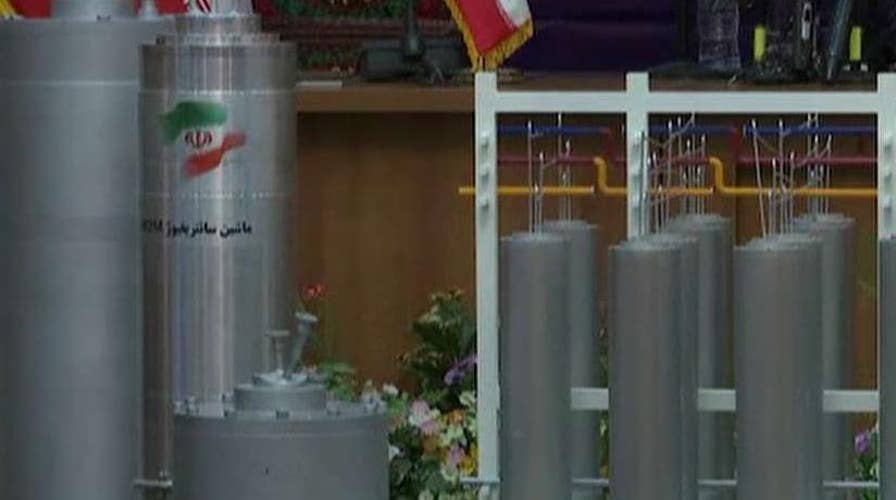Iran shows off new centrifuges in violation of nuclear deal
Defense Secretary Mark Esper says he's 'not surprised' Iran is violating terms of 2015 nuclear agreement; Lucas Tomlinson reports from the Pentagon.
In the Middle East, looking weak is the equivalent of wearing a "kick me" sign. And that’s now a problem for Tehran.
Iran has hit a headwind in the person of Donald Trump. The president has basically taken back all the benefits the regime gained from the deal it cut with Barack Obama. Trump has made the mullahs look smaller on the global stage, crimped their economy, and messed with Tehran’s surrogates.
Teheran’s top policy option now appears to be praying that Trump loses in 2020 and is replaced by a more pliant president. Still, the last thing they want to do is sit around meekly absorbing insults and injuries until January 2021 rolls around.
To shake off the growing signs of weakness, Iran flexed its muscles by threatening to close the Strait of Hormuz. That hasn’t worked out so well. They almost prompted a retaliatory military strike from Washington. Now, the U.S. and others are committing resources to protect freedom of navigation in the gulf. That issue seems to be fizzling.
Tehran also has been playing the nuclear card, threatening Europeans that, unless they pony up some serious cash and business opportunities, Iran will expand its uranium enrichment program beyond the limits they agreed to in the Iran Deal.
More from Opinion
Alas, for the mullahs, the Europeans have responded like a bad prom date. They keep making promises, but it is not clear they will be there for the last dance.
French leader Emmanuel Macron tried to engineer some kind of compromise path at the G-7, which included having the Iranians fly in for a guest appearance. His strategic staging ended without a final act. Nothing changed.
France followed up with proposing a $15 billion dollar line of credit for Iran. The U.S. seems to have deep-sixed that idea as well.
CLICK HERE TO SIGN UP FOR OUR OPINION NEWSLETTER
Meanwhile, Iran has tried to up the pressure on Europe even more. Iran has already breached the limits on uranium enrichment levels and stockpiling. United Nations inspectors have also reported another breach, confirming Iran has started installing what will be more than 30 new advanced centrifuges to enrich uranium.
Why Iran has gone with the uranium gambit as a counter-pressure tactic is a bit of a head-scratcher. It just reinforces the notion that the regime is determined to become a nuclear rogue threat. The fact that they so readily raced to breach the Iran Deal exposes it as little more than a small speed bump for restraining Tehran’s atomic ambitions.
Now, Tehran has rolled out another attempt to show economic strength: China’s declaration that it will invest $280 billion, over 25 years, in the Iranian oil sector. But, again, this display falls flat.
China is already sitting on millions of barrels of Iranian oil it doesn’t need. It’s just sitting there, stockpiled in Chinese ports. Clearly, Beijing doesn’t really want more oil. In fact, if China sold off its stockpiles, the value of Iranian crude on the global markets would plummet further.
If Tehran follows through on this deal, the most likely upshot is that the mullahs will wind up owing a lot of money they can’t pay back, and Beijing will wind up owning Iran’s oil industry — and maybe a lot more. That’s not really what the Iranian regime wants. It yearns to be a new Persian Empire, not a wholly-owned Chinese subsidiary.
The deal poses land mines for China as well. There is plenty of cheap oil already out there. The Chinese economy is slowing. Does it really make a lot of sense to spend a mountain of money for oil you don’t need, that in the end will likely cost you way, way more than what could be bought on the spot market?
If Beijing follows through with this deal, it could be a disastrous economic overreach. It also could land a number of Chinese companies and banks on sanction lists, blocked from doing far more lucrative deals with the West.
CLICK HERE TO GET THE FOX NEWS APP
Add all this up, it is far from clear how this mega-deal between Tehran and Beijing plays out.
So has Tehran really broken the back of the U.S. pressure campaign? All this "sturm und drang" from Tehran may amount to much less than headlines suggest. Indeed, unless the regime starts cutting a new and better deal with Washington pretty darn quickly, Iran may be facing 2021 in no better shape than it is in right now.








































